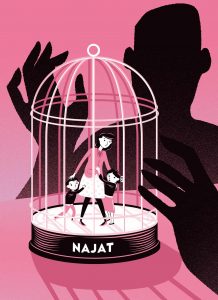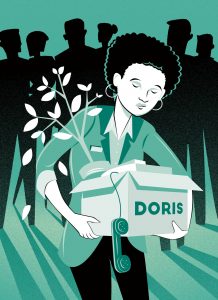The faces of economic violence

Najat's story
Najat immigrated to Canada after marrying Faïq.
He controlled every aspect of their lives. He managed all the bank accounts and paid all the bills. Najat was not allowed to leave the house and was constantly criticized for the way she raised their two children.
After ten years of marriage, Najat was determined to free herself from Faïq's control. So she left her husband. After his departure, Najat began to make plans to rebuild her life. But she was in for some nasty surprises...
When she checked her credit report, she discovered that her husband had taken out loans in her name, without her knowledge!
In addition to caring for herself and her two children, Najat now has a crushing debt to manage. Luckily, a local ACEF helped her. Her debt payments are now budgeted for. She lives well and her children want for nothing.
Jenny's story
Jenny is a bachelor's student in psychology.
She lives with her parents to minimize her expenses during her studies. But her parents are very controlling with her. In addition to supervising her social activities, they manage Jenny's personal finances entirely. Although Jenny works part-time in a restaurant chain, she has to hand over the money she earns to her parents.
Recently, Jenny intercepted a letter addressed to her from the university. She was informed that her school fees were overdue. She was worried about the situation, but didn't dare ask her parents for fear they would become angry.
Fearing that she won't be able to continue her studies, Jenny finally talks to her mother. She discovers that all the money she gave them went to pay rent and food, and that there's nothing left for her.
Jenny decided to move in with a friend and, with help, built up her financial independence. Today, she has a career in psychology, but is unfortunately no longer on good terms with her parents...
Suzanne's story
Suzanne is a successful professional.
For a long time, she hid the pain of her marriage to Jean. She hoped the violence would stop, but despite all his promises, Jean continued to be very controlling and contemptuous of her. Suzanne constantly had to ask Jean's permission to make the slightest expenditure. What's more, she had no idea how much they jointly owned.
After 15 years of marriage, Suzanne has decided to leave Jean. She doesn't know how to separate their assets and financial responsibilities. When Jean announced his departure, he emptied their joint account, leaving Suzanne with no access to cash. She's afraid no one will believe her, and she doesn't want her colleagues to find out she's a victim of economic violence.
Luckily, Suzanne found help at a women's center. There, she was able to find support and a listening ear, without judgment. Today, Suzanne has lost some of her material possessions, but she has regained her self-confidence. She now manages her finances, travels and saves!
Doris's story
Doris is a low-income single mother.
18 months ago, she lost her job because her husband kept harassing her at work. He called her several times a day and visited her during working hours. This situation affected her performance at work, and her employer had to let her go.
Since then, Doris has left her partner and started from scratch. To support herself and her three children, she now has to rely on welfare benefits. Doris isn't sure how to make ends meet without going into too much debt. She'd like to find a full-time job, but looking after her children alone is already asking a lot of her.
A friend helped her and told her that local job centers could help her find a suitable job. After a short training course, Doris now has a full-time job. With her network of friends, they exchange clothes and toys for the children.
Online questionnaire
Does your partner or a member of your family...
Recognizing economic violence
Economic violence is an act of domination and control that consists of depriving a person of money or preventing them from meeting their needs, or controlling and monitoring their economic activities to prevent them from achieving financial autonomy. It can be perpetrated by a partner or relative. Economic violence meets the definition of financial abuse.
The different forms of economic violence
- Control expenses or revenues
- Restricting access to money or giving an insufficient amount of money
- Limiting access to basic resources (food, medicine, clothing, etc.).
- Preventing or hindering employment or study outside the home
- Preventing people from earning money or engaging in any activity that could lead to financial independence
- Put all household assets in his or her name
- Put someone in debt and leave them responsible for making repayments
- Stealing a person's identity, money, credit or possessions
The consequences of economic violence
- Financial dependence
- Economic losses
- Indebtedness
- Tainted credit file
- Impact on physical health (stress and anxiety) and mental health (depression)
- Reduced self-confidence and ability to be autonomous
When one partner controls the household finances, it's often this economic pressure that traps women in abusive relationships.
How to get help
If you think you're a victim of economic abuse, it can be very difficult to live with. But there is help and strategies to help you understand the situation and regain control of your finances.
The first step is to talk to someone you trust. This could be a friend, family member, caregiver or healthcare professional (your doctor, for example).
You can also turn to resources dedicated to women or victims of domestic violence, here are a few:
SOS Domestic Violence
www.sosviolenceconjugale.ca | 514 873-9010 | 1 800 363-9010
Center d'aide aux victimes d'actes criminels (CAVAC)
www.cavac.qc.ca | 1 866 532-2822
Regroupement provincial des maisons d'hébergement et de transition pour femmes victimes de violence conjugale (French only)
http://maisons-femmes.qc.ca | 514 878-9134
L'R des centers de femmes du Québec - Réseau des centers de femmes du Québec
www.rcentres.qc.ca | 514 876-9965 (Montreal area)
Need help navigating your personal finances?
Visit the Quebec Consumer Associations portal to find the association in your area, as well as a wide range of information.
www.toutbiencalcule.ca
This initiative is supported by the Quebec government.




